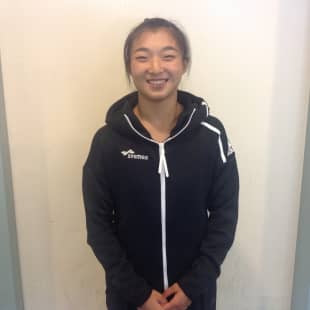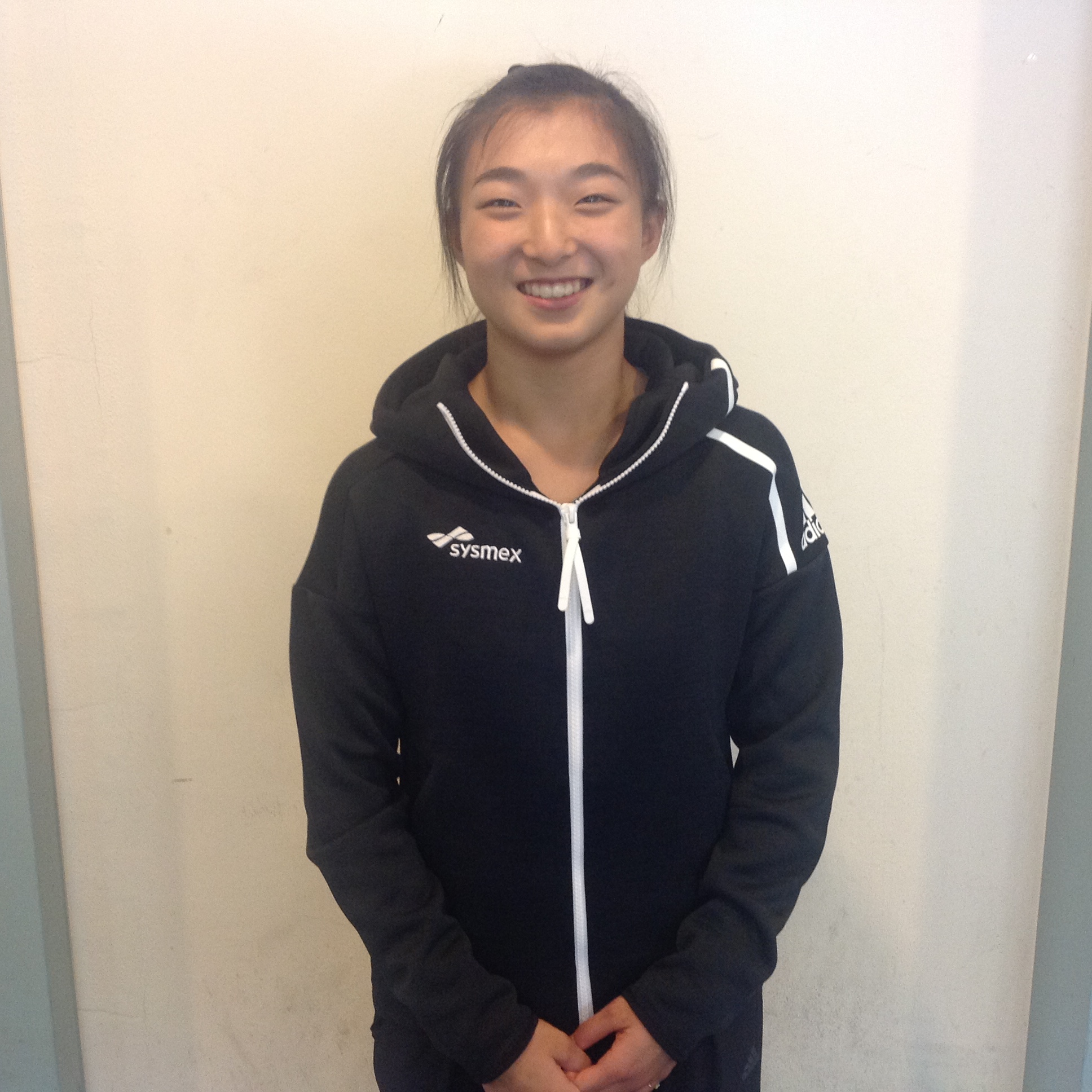Kaori Sakamoto took the skating world by storm last season in her first year as a senior competitor.
The 18-year-old finished second at Skate America last November, then took second again at the Japan championships in December to earn one of the two spots for women on Japan's Olympic team for Pyeongchang.
The Kobe native did not stop there. She won the Four Continents in Taipei just two weeks before the Winter Games began. Sakamoto then came in a very respectable sixth place in her first Olympics, after being fifth in the short program.
Before last season began, Sakamoto announced that her goal was to make the Olympic team, but many in the skating community would have considered her odds of doing so very long.
However, I have been watching Sakamoto skate for several years now and have always been impressed by her significant ability and considerable fortitude. That is why I was one of the few who predicted she would make Japan's Olympic team.
"I started thinking about making the Olympics when I was 15," Sakamoto stated during an exclusive interview with Ice Time last month while training in Nagano. "I was happy with last season and my performance. I knew I could do it,"
I asked the 158-cm Sakamoto, who is known for her big jumps, to detail what her Olympic experience was like.
"I had a very dynamic feeling of the environment at the Olympics," Sakamoto recalled. "I really enjoyed it and I didn't feel pressure. I enjoyed meeting athletes from other countries as well."

Ice Time wanted to know what Sakamoto felt when she saw compatriots Yuzuru Hanyu and Shoma Uno take the gold and silver, respectively, in the men's singles event in South Korea.
"It was great. I was proud of them," Sakamoto said.
Sometimes skaters will burst on the scene and succeed in their first season, only to suffer a letdown the next. Sakamoto, who will start her Grand Prix season this week at Skate America in Everett, Washington, isn't planning on letting that happen to her.
"My goal this season is to make the Grand Prix Final and world championships," Sakamoto stated firmly.
Sakamoto has long been an Ice Time favorite. When I told her I always admired her guts, she lit up with a big smile and a nod of the head like a person does when somebody has accurately described them.
"My coach (Sonoko Nakano) is tough. That is why I have no fear," Sakamoto noted. "I have been with her for 14 years now."
I questioned Sakamoto, who began skating when she was 4, who her idol was growing up.
"Mao-chan (Asada) and I also liked Akiko Suzuki and Shoma," Sakamoto commented.
Ice Time has observed how Sakamoto's cheerful personality has factored into her strong results. While many skaters are very nervous at events, Sakamoto is often bouncing around with a smile and joking with people. It is a formula that has worked well for her.
What I found interesting is that while interviewing her, Sakamoto was very serious. She often took more than 30 seconds before responding to a question, taking time to consider the response before giving it.
Sakamoto, who was Japan's junior champion in 2016, was in demand on the show circuit this summer in Japan.
"I enjoyed skating in shows this summer and interacting with the other skaters," Sakamoto stated. "I think my new programs are beautiful. The choreographers and coach picked the music."
Sakamoto came in fourth at the Lombardia Trophy in Italy in September in her season debut. I queried her about the reason behind the result.
"I didn't have enough practice time ahead of the event. It was too short," Sakamoto said.
Sakamoto, whose hobbies are origami and swimming, told Ice Time she wants to stay close to skating when her competitive and show days are over.
“I would like to become a coach someday,” Sakamoto commented. “Coaches have respect. I think I can help young skaters."
I asked Sakamoto to tell me what's the toughest part and best part about being an elite skater.
"Practice is the toughest part of being a skater," Sakamoto responded. "I like competing the best."
When I pointed out that many Japanese skaters over the years have gone to train overseas, Sakamoto told me she didn't seem to think it was for her.
"No. Because I have been with my coach for 14 years," Sakamoto replied. "I'm not planning on it."
Sakamoto, currently a third-year high school student, detailed that she has been working on improving her ability to speak in English.
"I go to English classes six times a month to improve my English conversational ability," Sakamoto said.
When I inquired about movies and music, Sakamoto informed me that she liked actor Ryoma Takeuchi and the rock group Back Number.
Sakamoto, who was the world junior bronze medalist in 2017, gave an interesting answer when Ice Time wanted to know what foreign skaters she admired.
"I like Kaetlyn Osmond," she stated. "I like good jumpers and I like Javier Fernandez."
Ice Time concluded the interview by asking if Sakamoto has always been so outgoing.
"I have always had the same personality," she commented with another smile.
GP season gets underway
Joining Sakamoto at the season-opening Skate America will be Olympic teammate Satoko Miyahara and Marin Honda. Japan has no men entered in the event.
In addition to her teammates, Sakamoto's primary competition in the U.S. will likely come from American Bradie Tennell, who won the Autumn Classic International last month, and Russia's Sofia Samodurova, who was second at the Lombardia Trophy, and took the gold at her two Junior Grand Prix events last season.
Yokoi breaks through
Yuhana Yokoi earned the first medal of her JGP career by taking the bronze in Yerevan, Armenia, on Friday with a total score of 184.09 points. The 18-year-old from Nagoya came from sixth place after the short program to make the podium with a beautiful free skate.
Russian phenom Alexandra Trusova, who landed the first quad lutz in international competition by a woman in her free skate, won the competition with 221.00.
Yokoi, currently in her third season on the JGP circuit, was second in the free skate with a personal best of 126.47. She landed seven clean triple jumps, earned level fours on all three of her spins, and did not receive a single negative grade of execution from any of the nine judges.
Yokoi was faced with an extra challenge, as the music in her free skate to "The Phantom of the Opera" cut out in the arena just over 1 minute and 30 seconds into her routine, during her step sequence. She had to pick up her program from where the music stopped when she resumed skating more than eight minutes later.
ISU rules state that if there is an interruption of more than 10 minutes, all of the skaters have to return to the ice for a second six-minute warm-up session. That wasn't necessary this time, but it came close.
"That was amazing. That was not easy," ISU announcer Ted Barton stated on the YouTube webcast of the event. "That's an eight-minute break. She had to keep herself warm. She had already skated clean to that point. She dare not make a mistake and she didn't."
Barton praised Yokoi's jumps in his review of her free skate.
"Look at the height this young lady climbs up into the air on this double axel," Barton commented. "Huge across the ice, the speed and the flow on the landing.
"Look at the speed coming down as she launches this triple flip," Barton analyzed. "Nice and tight and straight. Gets the free leg back."
After Yokoi's triple salchow/triple toe loop/double toe loop combination, Barton said, "Fierce competitor. Brilliant performance."
The Armenian crowd was very supportive of Yokoi when she started skating again after the break and gave her a warm round of applause when she finished. They showed real class.
"Given that it was my last performance in the Junior Grand Prix, I just had to enjoy it," Yokoi wrote in a Twitter message on Monday. "Even though the music stopped, I was thinking that maybe I'm getting to have a good experience because something like this could happen while I was skating.
"I thank my coach and members of the federation and trainers for their efforts to keep me relaxed," Yokoi continued. "Also, people in the venue gave me warm support and thanks to these I was able to resume my performance with composure. I was reminded of how support gives me strength."
Kagiyama shows potential
Yuma Kagiyama (202.02) made it two medals for Japan in Armenia after earning the silver on Saturday in the men's event. The 15-year-old from Yokohama is in his first year in the JGP series.
Kagiyama is coached by his father, Masakazu, a two-time Olympian (1992, 1994) for Japan in singles, who finished 13th in Albertville and 12th at Lillehammer.
Yuma was sixth after the short program, but won the free skate with a fine routine that saw him land seven clean triples and receive level fours on all of his spins.
Yuma was fourth in his JGP debut in Richmond, British Columbia, last month. That result along with his showing in Armenia combined to make him the third alternate for the JGP Final next month in Vancouver, British Columbia.
Koshiro Shimada will be Japan's only representative in the JGP Final. He qualified as the last of the six competitors based on his second-place showing in the Austria JGP and third-place finish at the Slovenia JGP.


















With your current subscription plan you can comment on stories. However, before writing your first comment, please create a display name in the Profile section of your subscriber account page.